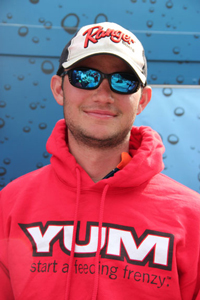|
Jordan Lee Qualifies |
Jordan Lee Blog, No. 1 - Spinnerbait Sends Lee To Classic - By Jordan Lee I qualified to fish the Bassmaster Classic – and on my home water of Lake Guntersville at that! Two lures played major roles in my qualification victory, a BOOYAH Double Willow spinnerbait and a Pad Crasher Frog. My first blog details exactly how I fished and personalized the spinnerbait, but first a tiny bit of history. Making it to the 2013 Carhartt College Series Bassmaster Classic Bracket event is a journey on a long road. You fish through qualifiers and tough regional competition to first earn your way to the Bassmaster College Series National Championship. This year, my partner, Shane Powell, and I represented Auburn University and competed with the “last chance” teams in the Wild Card round on Pickwick Lake. We qualified for the national championship by placing third. That finish put us into the Bassmaster Classic Bracket, and the winner fishes the Classic as the college representative. There, on the Grand River in Michigan, I won. This was not the first time I’d walked that weigh-in stage. Last year in the finals I fished against my brother, Matt, who edged me out and went on to represent Auburn and the rest of college bass fishing in the 2013 Classic. Watching him compete against the best anglers in the world made me realize how close I was to fulfilling my own dream of fishing the biggest tournament in the world. It burned a little. Getting this far takes a special mindset. At the risk of sounding like a cliché, you have to face the challenges one day at a time, one tournament at a time. You can’t worry about winning. You just want to put yourself in position to win, then make the right on-the-water adjustments. Your gear must be in tip-top shape, from your boat to your line to the exact lures you rely on. One wrong move, one failure, be it mental, physical or with your equipment, and the dream goes “poof.” At the College Classic tournament we had a day and a half to practice on the Grand River and tributary waters. I felt a tingle of excitement when I saw milfoil on that first practice day – that’s what I like! Coming from Alabama, fishing grass and boat docks is second nature. But I found that there was a lot of dead water in that river. I covered long stretches quickly with a spinnerbait and had a short burst of six or seven fish that clued me into a possible tournament pattern. The next day I checked out the lower portion of Norris Creek tributary, an area called Spring Lake. Again I needed to cover water and get as much information about the area as possible, so I grabbed the same spinnerbait (3/8-ounce Booyah Double Willow Blade in Snow White), put the trolling motor on high and started casting. I could see baitfish flicker in the sunlight, and they were pretty small, so I trimmed the skirt even with the hook bend and added a No. 2 trailer hook. While I wouldn’t say I whupped ‘em on the bait during practice, I did catch enough to gain confidence in that area and refine the pattern. I thought the spinnerbait would produce, at least early in the day. It was calm as we launched the first two days of the tournament. I weighed in two fish on the spinnerbait on Day One and two more the second day, all solid 2 ½-pound fish, which are pretty good on that river. Still, the bite didn’t last long. Just as it had been during practice, the spinnerbait bite was over after the first hour. The pattern was similar to what we see during the shad spawn on my home waters in Alabama. All the baitfish were in the grass in the morning. The flash of those willow blades drew strikes early, but as the sun came up the baitfish moved to the middle of the creek and the spinnerbait bite died. Conditions changed on Day Three, though, with heavy clouds and a good wind, and I caught a dozen good fish on the double-willow. It was near 10 a.m. before the baitfish moved out of the grass. Here are what I believe were the keys to that bite: Small blades were essential. The flash from the No. 3 and 3.5 willowleaf blades matched those of the available baitfish in size, vibration and intensity. Burning the bait to the boat was a necessity, especially when the sun got up there and the fish could see better. For a short time on Day Three I tried a bigger spinnerbait and found I couldn’t burn it back at the same speed, the vibration was more intense and it just didn’t feel right. I immediately resumed catching fish once I went back to “dance with the one that brought me.” Looking back, I’m amazed at the difference the little things make. I’d found the right combination of blade, skirt, weight, vibration, profile and retrieve speed for that water clarity, at that body of water, at that time of year under those conditions. Add in a dash of confidence and you put yourself in the position to win. In my next blog post, I’ll discuss the BOOYAH Poppin’ Pad Crasher, the other lure that figured into the pattern that stamped my ticket to the Classic. |
 Jordan Lee; "Getting this far takes a special mindset. At the risk of sounding like a cliché, you have to face the challenges one day at a time, one tournament at a time. You can’t worry about winning." |
| See More Fishing Articles, Fishing Reports and Fishing Videos click >> Fishing Archives Section . | |